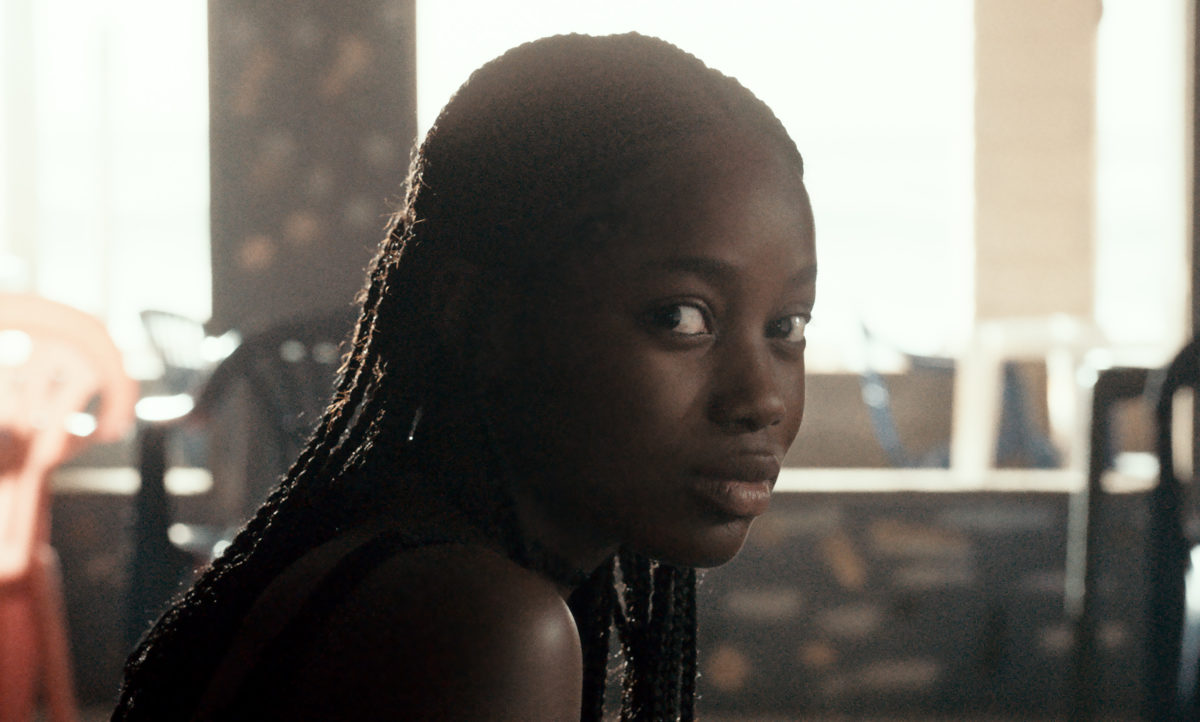As the sunrise tinges Dakar’s suburbs with dreamy orange, a colossal building looms in the background, watching over West Africa’s Atlantic coast like its own corporate Eye of Sauron. The specifics behind its futuristic presence are rather irrelevant, maybe even unknown to the Senegalese townsfolk who live in its vast shadow. Beyond the instant sense of aesthetic displeasure it spreads over the beach landscape, this monument of late capitalism has its most damning effects in its immediate surroundings, where human life’s value is reduced exclusively to what it brings in terms of labor and profit. This precise environment is where Mati Diop’s Atlantique sets its viewpoint.
After establishing her name and singular style through the lo-fi mysticism of shorter works like Mille soleils (2013) and Big in Vietnam (2012), the niece of legendary African auteur Djibril Diop Mambéty revisits her 2009 work Atlantiques, a 16 minute short about a group of Senegalese youths who plan to cross the Atlantic Ocean in order to get to Europe, by once again exploring its universe of neo-colonial uncertainty in her feature-length debut. Its setting is a desolate ecosystem of urban decay where missing wages are commonplace, and the young working class have to aimlessly throw themselves at the mercy of the sea, with the promise of a brighter future elsewhere as their sole compass. What differentiates the similarly titled films is that this year’s Cannes Grand Prix winner’s interest is no longer centered on the hopes and fears concerning the ambitions of the young men who set sail, rather focusing on how their absence is felt by the precocious females who have to stay behind in such a discouraging wasteland.
From the get-go, the nuances inherent to suburban African life are sympathetically portrayed through the rich textures of the shot-on-location cinematography, and the hypnotic bodily gestures of the non-professional actors: the hard labor of construction workers choreographed like a rugged ballet to the tune of composer Fatima Al Qadiri’s droning synths; and DP Claire Mathon’s intimate framing of sweaty skins that crowd the screen, oozing the effortless sensuality predominantly found in Claire Denis features. Diop, who starred in 35 rhums (Denis, 2008), seamlessly brings her own twist to Denis’ affectation, using an arresting sensory overload and an understanding of corporality to thoroughly submerge her film in a ghostly collection of sub-saharan maladies.
These start with a demonstration of discontent, orchestrated by the laborers delivering the finishing touches on the aforementioned grand high-rise, in which they demand their pay after 3 months of delay. One of the disgruntled blue-collar workers is Suleiman (Ibrahima Traoré), a lad who afterwards meets up with his star-crossed lover, Ada (Mame Bineta Sane). He tries to at least satisfy one of his carnal cravings in the afternoon, only to be turned away for a second time, cementing his decision to leave without further ado. Although reluctant to give up her virginity, Ada actually finds solace in her love for the restless Suleiman, as opposed to the overwhelming ennui she feels when with her pretentious fiancé Omar (Babacar Sylla). She sets out to meet Suleiman at the local bar at night, in the company of a group of girlfriends who have a similar plan in mind, but once they arrive there’s no one to greet them. As the kitschy fluorescent LED lights shroud their lonesome figures, they discover that all of their male contemporaries have been swallowed by the unforgiving waves of the Atlantic, putting their livelihood in a still patriarchal society in jeopardy.
Until this point, poetic shots of the dazzling texture of the setting sun and the soothing breadth of the sea are sporadically intertwined with the narrative threads, exemplifying the director’s congenital lyrical flair (her father is celebrated musician Wasis Diop). They are first understood as means for atmospheric immersion, but once those thought lost at sea begin to lurk again in everyday life, the shots’ nature is unveiled as a symbolic signifier of an otherworldly cycle. At night, Dakar’s streets are stricken by inhuman fevers; the young ladies affected by the mysterious malady have their eyes turn white and their movement’s become sloppy, in the vein of voodoo classic I Walked With A Zombie (Jacques Tourneur, 1943). Their demeanor is now gloomily guided by the restless souls of those led astray at sea; their only driving force is that of an instinctive reclamation of what they seem to consider rightfully theirs, be it deferred monetary compensation or a well-anticipated moment of prurient elation.
Even if initially jarring, said transition towards genre can be felt ingrained throughout the picture in its expressionistic formal approach and ebb-and-flow structure, foreshadowing the phantasmagorical by way of its oneiric atmosphere. Like in her uncle’s provocative Touki Bouki (1973), myth and everyday life bleed into one another as means to understand the absurdity of ambition in the so-called “Third World”. In contrast with her ancestor’s more acidic tone, Diop does shows an earnest esteem for the commonality of desires.
Absurd in its premise, the possessed bodies’ pursuit for economic retribution (not even death is a way out of debt, it seems) is just incidental to Atlantique’s real anchor: the anomaly of Ada and Suleiman’s posthumous romantic encounter. In a landscape reigned by effigies of the forsaken, these two effervescent spirits throw everything out the window for one last moment of intimate closure; their quest for connection is the one thing that endures in the arid badlands of cultural colonialism.
